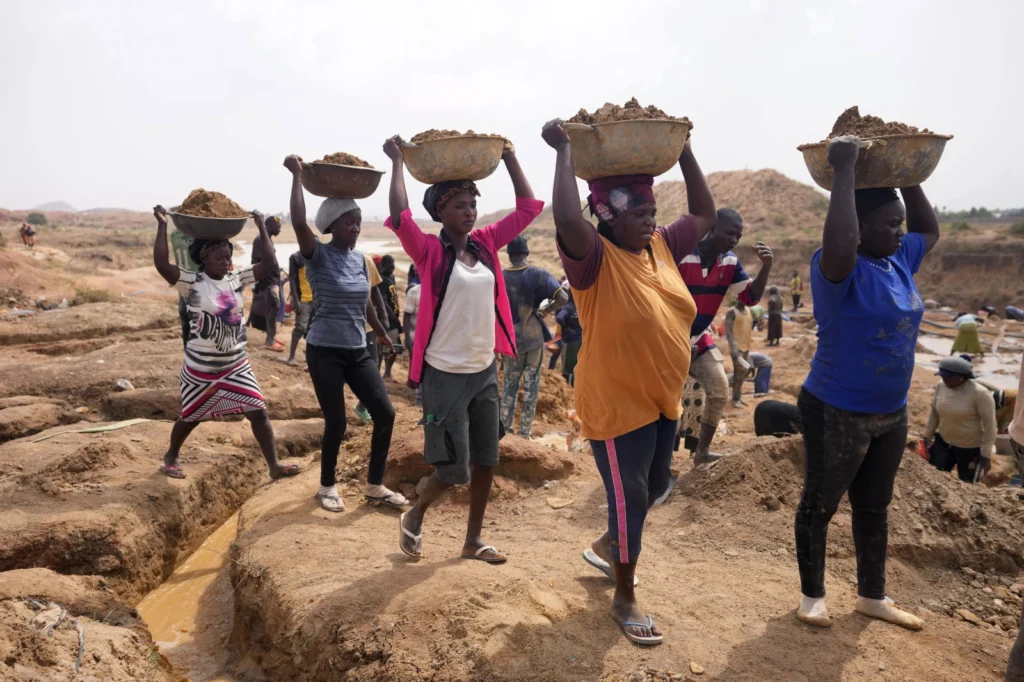Illegal mining in Africa is on the rise and is driven by rising global demand for precious minerals. This underground industry, largely unregulated, is thriving in countries like Ghana, Nigeria, and the Democratic Republic of Congo.
Small-scale miners often use rudimentary techniques, to extract gold, diamonds, and cobalt, leading to significant environmental degradation and health risks.
Local communities face contaminated water supplies and deforestation, while conflicts over land rights intensify.
In recent events, Nigeria’s government has been cracking down on illegal mining, arresting dozens of unlicensed miners since April 2024 for allegedly stealing the country’s lithium. This critical mineral is essential for batteries used in electric vehicles, smartphones, and power systems.
The arrests are part of Nigeria’s efforts to regulate its mining operations, curb illegal activities, and better benefit from its mineral resources.
The global shift towards clean energy has increased the demand for lithium and other minerals. However, illegal mining remains rampant due to corruption and the remote locations of mineral deposits. Also, profits from illicit mining have reportedly funded militia groups in northern Nigeria.
In mid-May, a joint team of soldiers and police raided a remote market in Kishi, Oyo State, arresting 32 individuals, including two Chinese nationals. The operation also resulted in the seizure of large quantities of lithium.
According to Jimoh Bioku, a Kishi community leader, there had been “clandestine searches” for the mineral at hard-to-reach sites in the past years by Chinese nationals before “they engaged people to dig for them and turned the market into a transit point.”
The community was “particularly worried about the insecurity that usually follows illegal mining and that was why we reported to the state government,” he said.
China dominates the global electric vehicle (EV) supply chain, with its influence extending to Nigeria. China-owned companies employ many vulnerable individuals, drawing them from Nigeria’s conflict-ridden and rapidly desertifying far north to work in mining operations across the nation.
However, China’s presence often raises concerns due to environmentally damaging practices, exploitative labor, and involvement in illicit mining. In the past two months alone, there have been three instances of illegal mining arrests involving Chinese nationals.
President Bola Tinubu repeatedly pointed to illegal mining as a major factor exacerbating conflicts in Nigeria’s north. He has appealed to the international community for assistance in combating this issue, which provides armed groups with the funds necessary to sustain and arm themselves.

Lithium Boom Fuels Nigeria’s Illegal Mining
Nigeria is emerging as a new source of lithium in Africa, as major producers like Australia and Chile struggle to meet global demand.
However, illegal mining activities flourish in Nigeria’s extractive sector, depriving the government of significant revenue, according to Emeka Okoro of Lagos-based SBM Intelligence, which researches illicit mining and terrorism financing in northern Nigeria.
Moreover, the convergence of conflict and climate change in Nigeria’s north has transformed once fertile lands into arid wastelands, creating cheap labor for mining operations.
This vulnerable workforce is often exploited in the growing lithium mining operations, exacerbating the challenges in regulating the sector and ensuring fair economic benefits for the country.
According to Okoro, the arrests of “both Chinese nationals and young Hausa boys from conflict-affected regions underscore a troubling pattern.”
“The socioeconomic strain stemming from conflict and the repercussions of climate change has given rise to a vulnerable demographic desperate for survival.”
Emeka Okoro
According to the extractive industry transparency watchdog, illegal mining in Nigeria causes the government to lose $9 billion annually. In response, Nigeria established a 2,200-strong “corps of mining marshals” earlier this year.
Led by the Solid Minerals Ministry, this new force aims to curb illegal mining activities. Segun Tomori, spokesperson for the ministry, emphasized that while existing law enforcement agencies are still tackling the problem, the focus of the mining marshals is specifically on addressing the nefarious activities of illegal miners.
READ ALSO: Israel Takes Vindictiveness To A New Level























